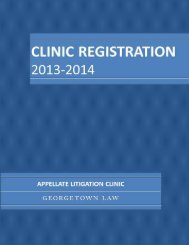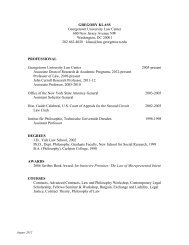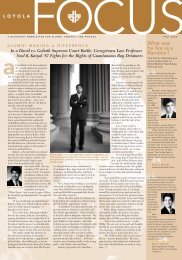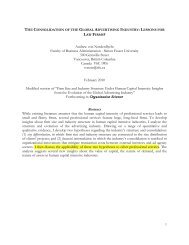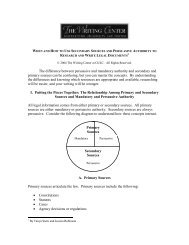Date: April 12, 2013 Topic: The Shrinking ... - Georgetown Law
Date: April 12, 2013 Topic: The Shrinking ... - Georgetown Law
Date: April 12, 2013 Topic: The Shrinking ... - Georgetown Law
You also want an ePaper? Increase the reach of your titles
YUMPU automatically turns print PDFs into web optimized ePapers that Google loves.
Our research reconciles these two different perspectives. We find that KMS use only<br />
leads to new relationship formation when there exists social capital to support it, in the form of<br />
indirect ties; otherwise, KMS use decreases relationship formation. We also find that KMS use<br />
increases value creation among those with existing direct ties--and actually decreases revenue<br />
generation where ties are lacking. Finally, we find that the positive effects of KMS use depend<br />
on pre-existing social capital (indirect ties), in terms of both relationship formation and value<br />
creation outcomes.<br />
<strong>The</strong>re are some important limitations in our analysis. Although we control for differences<br />
across individuals by using random- and fixed-effects regression models, our analysis is still<br />
limited by the fact that the data come from a single case firm. We cannot generalize to other<br />
settings where the rules, incentives or norms regarding workplace collaboration could be<br />
different than those in our setting. In addition, differences in the KMS technologies implemented<br />
and in the country jurisdictions where firms operate could also influence the ways that this<br />
technology impacts relationships and value creation. Nonetheless, our study provides one of the<br />
first systematic investigations of how technology-based knowledge sharing affects the fabric of<br />
relationships and the production of economic value.<br />
Contributions<br />
Our findings suggest that for complex knowledge organizations such as law firms, KMS<br />
is best used as an entry point into collaborations that can be productive—and works best when<br />
applied to knowledge that is “local” in the sense of complemented with existing workplace<br />
relationships. <strong>The</strong> idea that the KMS can facilitate knowledge reuse directly is not supported, this<br />
can even hurt value creation efforts.<br />
Most thinking about the benefits of implementing searchable knowledge databases in<br />
organizations has focused on individuals’ ability to discover and access distant knowledge that<br />
they would not otherwise have been exposed to. Yet we find little evidence that distant search<br />
pays off: downloading documents from unconnected others does not lead to new working<br />
relationships, and actually harms subsequent revenue generation.<br />
Our study contributes to theory on technology and relationships. We help unpack how the<br />
introduction of a new technology influences relationship formation and social capital among<br />
organizational members. In doing so, we help to reconcile a materialist view and a social view of<br />
technology use by showing that the positive effects of technology use require pre-existing social<br />
capital to be realized.<br />
Further, taking our findings on relationship formation and value creation together<br />
suggests an inversion of common thinking about the way technology complements social<br />
relationships: instead of the former being useful where the latter is lacking, it appears that—at<br />
least in the case of complex knowledge production—search technology is most useful in the<br />
context of close social relations.<br />
Our findings also contribute to networks research. In contrast to what we might expect<br />
based on weak tie theory, we find that more value is created from downloading direct contacts<br />
than downloading indirect weak tie contacts. This is true, even though people are likely to have<br />
more overlapping knowledge with their strong ties. This finding suggests that some of the most<br />
productive discovery and learning from use of knowledge databases occurs among close<br />
colleagues with prior working relationships.<br />
<br />
10




